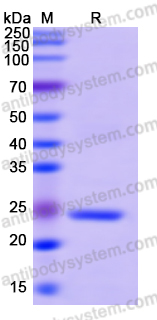Catalog No.
YHG43801
Expression system
E. coli
Species
Homo sapiens (Human)
Protein length
Asp645-Val872
Predicted molecular weight
26.91 kDa
Nature
Recombinant
Endotoxin level
Please contact with the lab for this information.
Purity
>90% as determined by SDS-PAGE.
Accession
Q13200
Applications
ELISA, Immunogen, SDS-PAGE, WB, Bioactivity testing in progress
Form
Lyophilized
Storage buffer
Lyophilized from a solution in PBS pH 7.4, 0.02% NLS, 1mM EDTA, 4% Trehalose, 1% Mannitol.
Reconstitution
Reconstitute in sterile water for a stock solution. A copy of datasheet will be provided with the products, please refer to it for details.
Shipping
In general, proteins are provided as lyophilized powder/frozen liquid. They are shipped out with dry ice/blue ice unless customers require otherwise.
Stability and Storage
Use a manual defrost freezer and avoid repeated freeze thaw cycles. Store at 2 to 8°C for frequent use. Store at -20 to -80°C for twelve months from the date of receipt.
Alternative Names
26S proteasome regulatory subunit S2, 26S proteasome non-ATPase regulatory subunit 2, TRAP2, 26S proteasome subunit p97, 26S proteasome regulatory subunit RPN1, PSMD2, Protein 55.11, Tumor necrosis factor type 1 receptor-associated protein 2
Structural insights into the ubiquitin-independent midnolin-proteasome pathway., PMID:40339123
Ubiquitin-proteasome Pathway-linked Gene Signatures as Prognostic Indicators in Prostate Cancer., PMID:40295064
Glucosidase alpha neutral C promotes influenza virus replication by inhibiting proteosome-dependent degradation of hemagglutinin., PMID:40263249
Biomarkers in advanced renal cell carcinoma: current practice and future directions., PMID:40156235
Expression of PSMD2 gene in hepatocellular carcinoma and its correlation with immune checkpoints and prognosis., PMID:40128277
Integrative analysis of serum proteomics and transcriptomics in hepatitis C., PMID:40082995
Structural basis for the midnolin-proteasome pathway and its role in suppressing myeloma., PMID:40027645
Rational strategies for designing next-generation oncolytic viruses based on transcriptome analysis of tumor cells infected with oncolytic herpes simplex virus-1., PMID:39850819
Both 20S and 19S proteasome components are essential for meiosis in male mice., PMID:39757018
Identification of PSMD2 as a promising biomarker for pancreatic cancer patients based on comprehensive bioinformatics and in vitro studies., PMID:39634424
Interaction between CD244 and SHP2 regulates inflammation in chronic obstructive pulmonary disease via targeting the MAPK/NF-κB signaling pathway., PMID:39423200
Nitrogen mustard induces dynamic nuclear protein spectrum change and DNA-protein crosslinking, with p97 mediating repair., PMID:39290288
PSMD2 overexpression as a biomarker for resistance and prognosis in renal cell carcinoma treated with immune checkpoint and tyrosine kinase inhibitors., PMID:39222176
USP24 promotes hepatocellular carcinoma tumorigenesis through deubiquitinating and stabilizing TRAF2., PMID:39127151
TNIK depletion induces inflammation and apoptosis in injured renal proximal tubule epithelial cells., PMID:38482555
A viral movement protein targets host catalases for 26S proteasome-mediated degradation to facilitate viral infection and aphid transmission in wheat., PMID:38454602
Unlocking hepatocellular carcinoma aggression: STAMBPL1-mediated TRAF2 deubiquitination activates WNT/PI3K/NF-kb signaling pathway., PMID:38419066
CRISPR-Cas9 screen of E3 ubiquitin ligases identifies TRAF2 and UHRF1 as regulators of HIV latency in primary human T cells., PMID:38411080
Integrated transcriptomics and proteomics analysis reveals muscle metabolism effects of dietary Ulva lactuca and ulvan lyase supplementation in weaned piglets., PMID:38409238
DNAJA4 suppresses epithelial-mesenchymal transition and metastasis in nasopharyngeal carcinoma via PSMD2-mediated MYH9 degradation., PMID:37875476
Dual network analysis of transcriptome data for discovery of new therapeutic targets in non-small cell lung cancer., PMID:37864031
RACK1 facilitates breast cancer progression by competitively inhibiting the binding of β-catenin to PSMD2 and enhancing the stability of β-catenin., PMID:37848434
A novel immunogenic cell death-related genes signature for predicting prognosis, immune landscape and immunotherapy effect in hepatocellular carcinoma., PMID:37698679
Hydroquinidine displays a significant anticarcinogenic activity in breast and ovarian cancer cells via inhibiting cell-cycle and stimulating apoptosis., PMID:37529110
The deubiquitinating enzyme OTUD7b protects dendritic cells from TNF-induced apoptosis by stabilizing the E3 ligase TRAF2., PMID:37516734
Comprehensive analysis of PSMD family members and validation of PSMD9 as a potential therapeutic target in human glioblastoma., PMID:37485655
TRAF2 promotes M2-polarized tumor-associated macrophage infiltration, angiogenesis and cancer progression by inhibiting autophagy in clear cell renal cell carcinoma., PMID:37415241
Molecular crosstalk between COVID-19 and Alzheimer's disease using microarray and RNA-seq datasets: A system biology approach., PMID:37359008
An engineered cell line with a hRpn1-attached handle to isolate proteasomes., PMID:37354974
PSMD8 can serve as potential biomarker and therapeutic target of the PSMD family in ovarian cancer: based on bioinformatics analysis and in vitro validation., PMID:37349676
The TRAF2-p62 axis promotes proliferation and survival of liver cancer by activating mTORC1 pathway., PMID:37081115
PSMD2 contributes to the progression of esophageal squamous cell carcinoma by repressing autophagy., PMID:36998052
Weighted gene co-expression network analysis reveals the hub genes associated with pulmonary hypertension., PMID:36740764
Targeted degradation via direct 26S proteasome recruitment., PMID:36577875
Identification and Analysis of Immune-Related Gene Signature in Hepatocellular Carcinoma., PMID:36292719
The contribution of proteasomal impairment to autophagy activation by C9orf72 poly-GA aggregates., PMID:36036324
Proteasomal Degradation of TRAF2 Mediates Mitochondrial Dysfunction in Doxorubicin-Cardiomyopathy., PMID:35983756
Prognostic Implication and Immunological Role of PSMD2 in Lung Adenocarcinoma., PMID:35754829
A Data Science Approach for the Identification of Molecular Signatures of Aggressive Cancers., PMID:35565454
Anticancer effects of disulfiram in T-cell malignancies through NPL4-mediated ubiquitin-proteasome pathway., PMID:35363385
Revisited role of TRAF2 and TRAF2 C-terminal domain in endoplasmic reticulum stress-induced autophagy in HAP1 leukemia cells., PMID:35257890
Identifying Potential Mitochondrial Proteome Signatures Associated with the Pathogenesis of Pulmonary Arterial Hypertension in the Rat Model., PMID:35237384
Diverse Ras-related GTPase DIRAS2, downregulated by PSMD2 in a proteasome-mediated way, inhibits colorectal cancer proliferation by blocking NF-κB signaling., PMID:35173535
The Prognostic Significance of Proteasome 26S Subunit, Non-ATPase (PSMD) Genes for Bladder Urothelial Carcinoma Patients., PMID:34992336
AHSA1 is a promising therapeutic target for cellular proliferation and proteasome inhibitor resistance in multiple myeloma., PMID:34991674
Prognostic and immune infiltration signatures of proteasome 26S subunit, non-ATPase (PSMD) family genes in breast cancer patients., PMID:34839279
RIPK1 and TRADD Regulate TNF-Induced Signaling and Ripoptosome Formation., PMID:34830347
Gene expression with corresponding pathways analysis in Gaucher disease., PMID:34481839
Ketamine enhances autophagy and endoplasmic reticulum stress in rats and SV-HUC-1 cells via activating IRE1-TRAF2-ASK1-JNK pathway., PMID:34427546
Comprehensive analysis of ubiquitin-proteasome system genes related to prognosis and immunosuppression in head and neck squamous cell carcinoma., PMID:34398824

